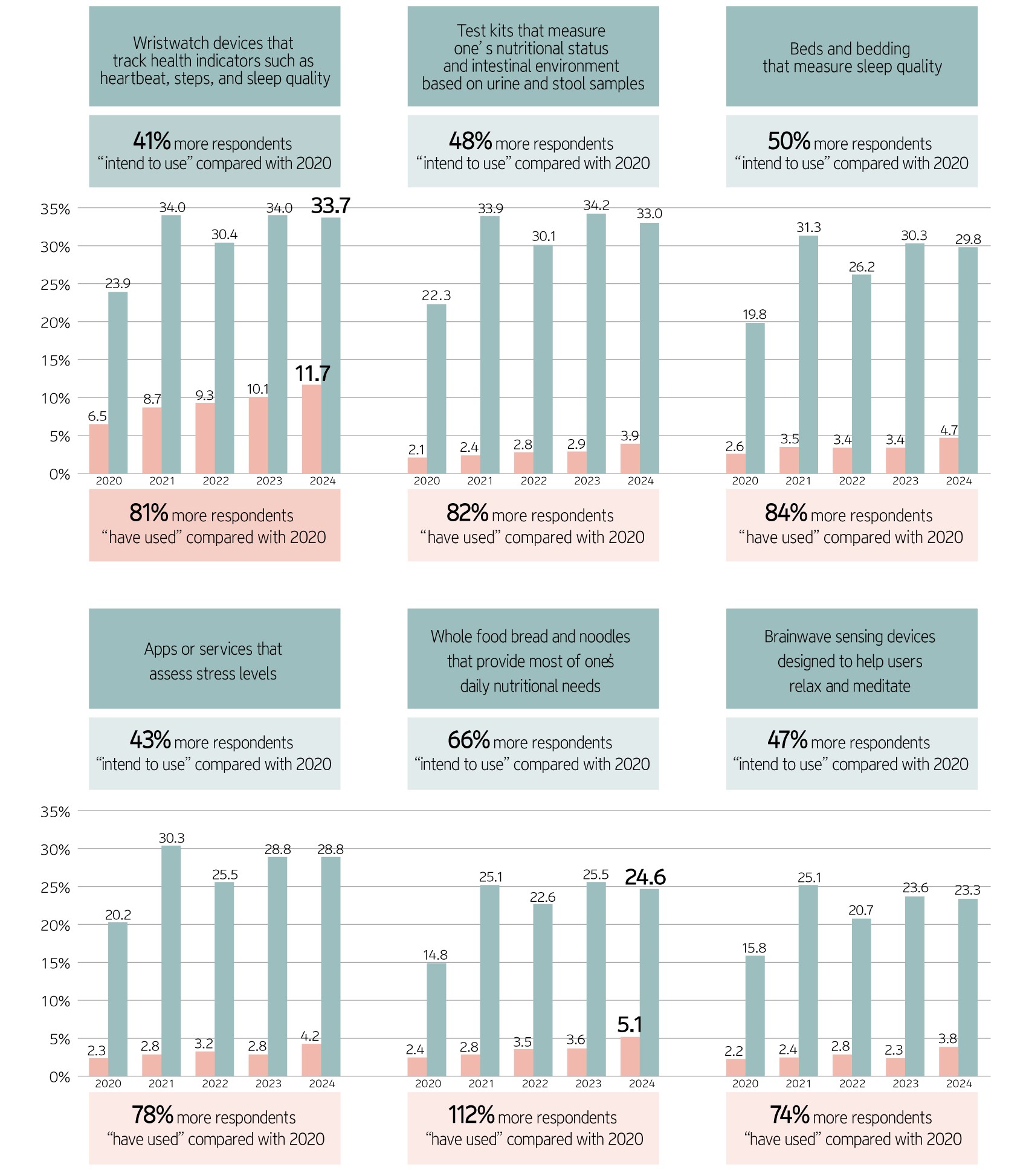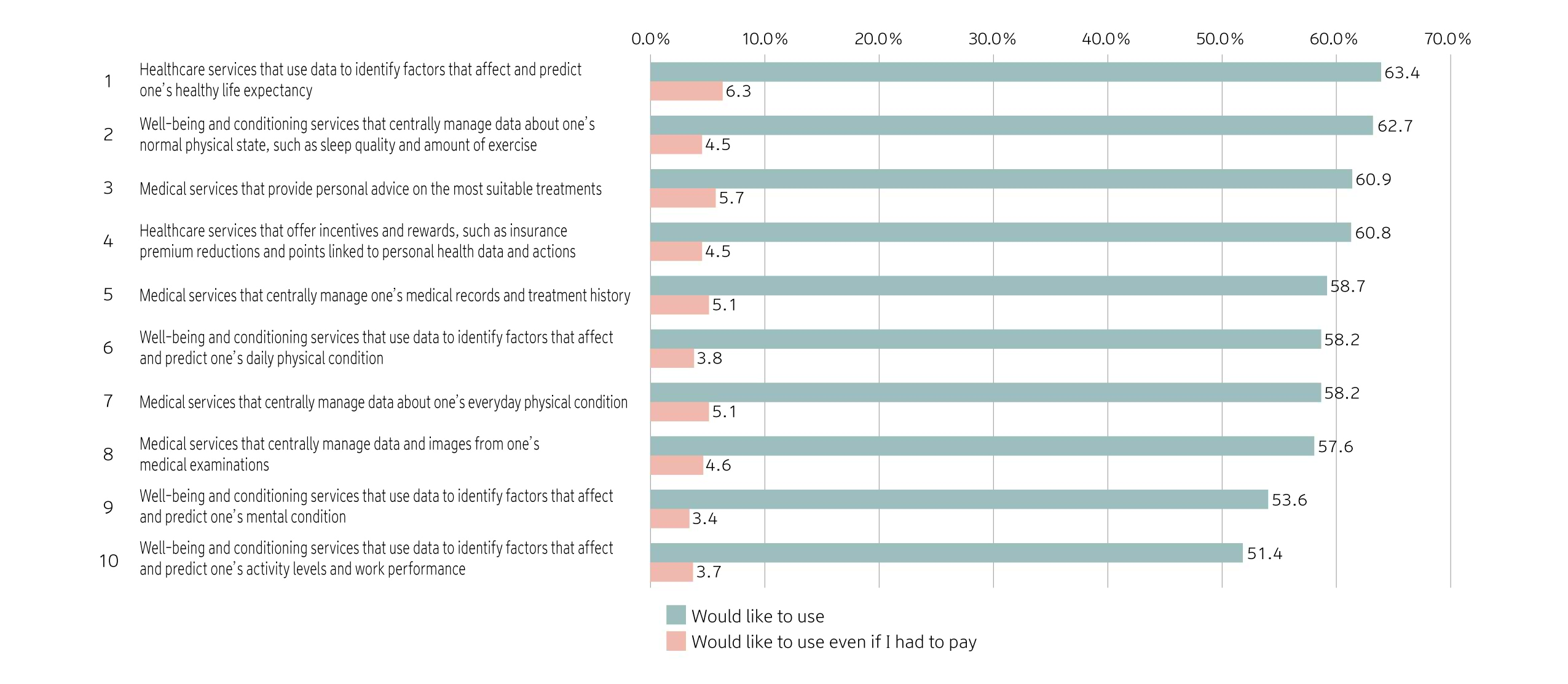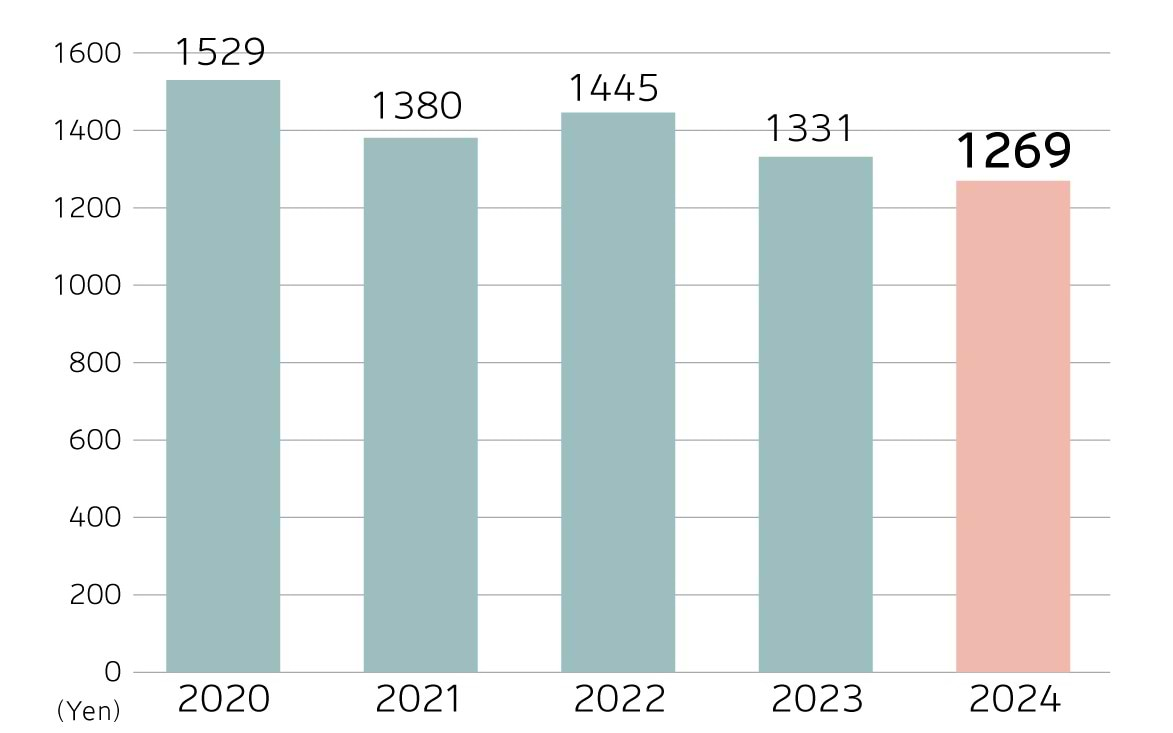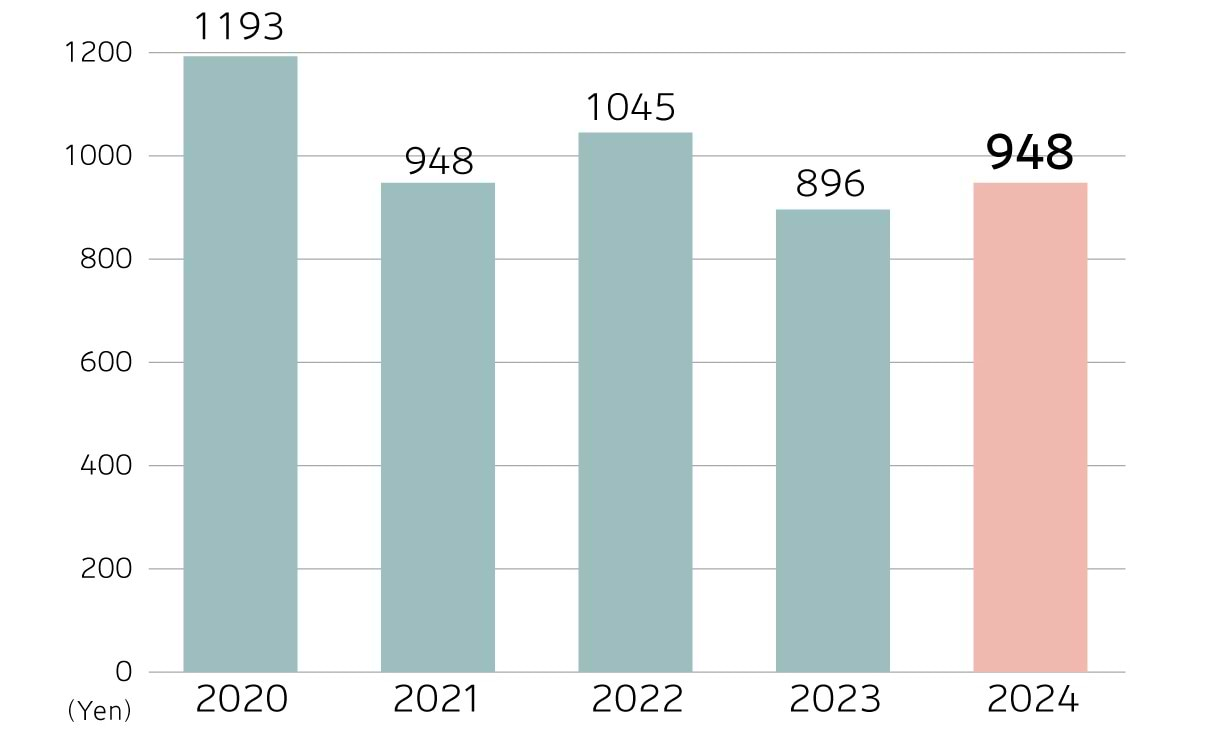More consumers opting to assess health technology-related goods and services
Dentsu Inc. (President & CEO: Takeshi Sano; Head Office: Tokyo) today announced the results of its 18th Wellness Survey of 10,000 people. The nationwide online survey was completed in June this year by a total of 10,000 male and female respondents between the ages of 20 and 69.
The survey was overseen by the Dentsu Healthcare Team, a specialized organization offering a multitude of services, ranging from the development of strategies and business models for the healthcare market to market entry and public relations campaigns.
Dentsu has conducted the annual survey since 2007. The goal is to identify emerging trends and needs in Japan's healthcare market, based on consumer health awareness and habits. The key findings of the 2024 survey are presented below.
Key Findings
1.The health technology-related products and services that most of the survey respondents say they "intend to use" or "have used" are "wristwatch devices that track health indicators such as heartbeat, steps, and sleep quality." These items are selected by 33.7% and 11.7% of the respondents, respectively. Compared with the 2020 survey results, the number of respondents who have used the devices increased 81%.
Respondents who intend to use and have used products that measure their nutritional status and intestinal environment, as well as sleep quality, also increased substantially compared with the 2020 results.
2.Among the health conditions which respondents are most interested in having personal data for are "mental fatigue and stress levels," as well as "sleep quality." These responses are most commonly selected by female respondents. "Blood pressure" together with "body fat percentage and visceral fat level" are most commonly selected by male respondents. More than half of all respondents also indicate they would like to use healthcare data management services.
3.The survey respondents indicate that they spent an average of ¥1,269 per month on personal health products, the lowest amount in the past five years. On average, ¥948 is spent monthly on personal health services, up from ¥896 in 2023.
4.The top cause of headaches selected by 55.5% of respondents was "changes in barometric pressure." This weather-related phenomenon is also among the top three causes given for other minor health problems, such as "tinnitus or clogged ears" and "listlessness."
5.The "Well-being" awareness rate was 31.1% for all respondents. While this result is more than 10 percentage points higher than the result in 2022 when the question was first included in the survey, it suggests that only around 30% of Japanese consumers are familiar with this word.
Note: The survey response results do not always add up to 100% because they have been rounded to the first decimal place.
Details of Findings
1.The health technology-related products and services that most of the survey respondents say they "intend to use" or "have used" are "wristwatch devices that track health indicators such as heartbeat, steps, and sleep quality." These items are selected by 33.7% and 11.7% of the respondents, respectively. Compared with the 2020 survey results, the number of respondents who have used the devices increased 81%.
Respondents who intend to use and have used products that measure one's nutritional status and intestinal environment, as well as sleep quality, also increased substantially compared with the 2020 results.
- Among health technology-related products and services listed in the survey, "wristwatch devices that track health indicators such as heartbeat, steps, and sleep quality" have been used by 11.7% of all respondents, while 33.7% indicate they intend to use the devices. The results are the highest to date for this question.
In addition, compared with the 2020 survey results, respondents who intend to use or have used the devices show an increase of 41% and 81%, respectively. (Chart 1) - A total of 33.0% of all respondents express their intention to use "test kits that measure one's nutritional status and intestinal environment based on urine and stool samples," and 3.9% state they have used the products. Moreover, 29.8% indicate they intend to use "beds and bedding that measure sleep quality," while some 4.7% say they have used the products. These results are substantially higher than the results for the 2020 survey. (Chart 1)
- The number of survey respondents who intend to use or have used "whole food bread and noodles that provide most of one's daily nutritional needs" also increased compared with the 2020 numbers, coming in at 24.6% and 5.1%, respectively. (Chart 1)
Chart 1
Responses to the question, "Have you used the following healthcare-related products or services, and do you intend to use them in the future?" (n10,000)

2.Among the health conditions which respondents are most interested in having personal data for are "mental fatigue and stress levels," as well as "sleep quality." These responses are most commonly selected by female respondents. "Blood pressure" together with "body fat percentage and visceral fat level" are most commonly selected by male respondents. More than half of all respondents also indicate they would like to use healthcare data management services.
- Among the healthcare conditions listed in the survey, female respondents are most interested in having personal data for "mental fatigue and stress levels" at 39.0%. This is followed by "sleep quality" and "hormone balance" at 36.3% and 33.4%, respectively.
For male respondents, "blood pressure" and "body fat percentage and visceral fat level" are the top responses, coming in at 36.6% and 29.6%, respectively. (Chart 2)
- Among the healthcare data management services that most respondents would like to use, "healthcare services that use data to identify factors that affect and predict one's healthy life expectancy" is selected by 63.4% of all respondents. Of those, 62.7% have chosen "well-being and conditioning services that centrally manage data about one's normal physical state, such as sleep quality and amount of exercise." More than half of all respondents indicate they would like to use all of the services listed in the survey, although less than 10% state they would like to use the services for a fee. (Chart 3)
Chart 2
Responses to the question, "Are you interested in having personal data for the following health conditions?" (n10,000)

Note: Only the top 10 most commonly selected items are given.
Chart 3
Responses to the question, "Would you like to use the following healthcare data management services?" (n10,000)
 Note: Only the 10 most commonly selected answers for "Would like to use" are shown.
Note: Only the 10 most commonly selected answers for "Would like to use" are shown.
3.The survey respondents say they spent an average of ¥1,269 per month on personal health products, the lowest amount for the five years the survey has been conducted. The monthly average amount spent on personal health services is ¥948, up from ¥896 in 2023.
- The amount spent on personal health products per month averages ¥1,269 for all respondents, down from ¥1,331 spent in 2023 and the lowest amount recorded in the survey over the past five years. (Chart 4)
- The average amount spent on personal health services each month increased from ¥896 in 2023 to ¥948 in this year's survey. (Chart 5)
Chart 4
Responses to the question, "How much money do you spend each month on products for your personal health?" (Results are averages for all respondents) (n10,000)
Chart 5
Responses to the question, "How much money do you spend each month on services for your personal health?" (Results are averages for all respondents) (n10,000)

4.The top cause of headaches selected by 55.5% of respondents was "changes in barometric pressure." This weather-related phenomenon is also among the top three causes given for other minor health problems, such as "tinnitus or clogged ears" and "listlessness."
- Among respondents who are regularly bothered by headaches, 55.5% selected the weather-related answer, "changes in barometric pressure," as the cause. This is followed by "stress" and "physical disposition" at 51.2% and 29.7%, respectively. Moreover, "changes in barometric pressure" is among the top three causes of minor health problems selected by respondents for "tinnitus or clogged ears," "listlessness," "gloominess," "low motivation," "inability to concentrate," and "shoulder and neck stiffness." (Chart 6)
Chart 6
Responses to the question, "Do any of the following health problems bother you on a regular basis, and if so, what do you think the causes are? (Multiple answers acceptable)" (n6,883)

Notes:
1.The responses shown in the table are all of those that include "changes in barometric pressure" among the top three causes given for minor health problems.
2.Respondents were those who selected "minor health problems" in response to questions about physical and mental illness.
5.The "Well-being" awareness rate was 31.1% for all respondents. While this result is more than 10 percentage points higher than the result in 2022 when the question was first included in the survey, it suggests that only around 30% of Japanese consumers are familiar with this word.
- Among the survey respondents, 31.1% indicated awareness of the word "Well-being," with 7.0% answering "I understand the meaning" and 24.2% answering "I am aware of the word but I do not know its meaning." The corresponding results in 2022 when the question first appeared in the survey were 4.6% and 16.2%, respectively, for a combined total of 20.8%. Although the awareness rate has risen by more than 10 percentage points since then, the result indicates that less than a third of all survey respondents are aware this word. (Chart 7)
Chart 7
Responses to the question, "Are you aware of the word "Well-being," and do you understand its meaning?" (n10,000)

Comment from the Dentsu Healthcare Team
"For this year's survey, we added new questions about the causes of minor health problems and interest in personal healthcare data. Among the survey results, "changes in barometric pressure," a weather-related phenomenon, was reported by many respondents as a cause of minor health problems.
"This suggests that climate change has been impacting people's health in recent years. The survey responses about interest in personal healthcare data highlights women's awareness of mental healthcare, the need for sleep and rest, and the psychological effects of hormone imbalances.
"Moreover, the results show growth in the use of, and the intention to use, health technology-related products and services that measure sleep quality and stress levels.
"We hope that the current status of people's wellness along with related awareness, insights, and changing trends identified by this survey are useful for those in the healthcare industry who conduct marketing campaigns and develop services that promote healthy behaviors."
About the Dentsu Healthcare Team
Made up of planners specializing in healthcare, the Dentsu Healthcare Team helps clients devise business and marketing strategies across a wide range of areas, including prescription drugs, over-the-counter medicines, food products, and health technology. The team assists with projects and communication in the healthcare industry by using many data sources, including this annual Wellness Survey, as well as surveys of medical doctors, pharmacists, and patients.
Survey Overview
Objective: To understand the current state of Japan's healthcare market and to predict future trends based on the health awareness and habits of consumers
Sample Area: Nationwide in Japan
Target Sample: Male and female consumers between the ages of 20 and 69
Sample Size: 10,000 respondents
Survey Method: Internet-based survey
Survey Period: From June 7 to 10, 2024
Survey Institution: Dentsu Macromill Insight, Inc.
#####
Contact
Media-related inquiries:
Branding Office, Dentsu Corporate One Inc.
Email: global.communications@dentsu.co.jp
Survey-related inquiries:
Dentsu Healthcare Team, Dentsu Inc.
Email: dentsu-healthcareteam@dentsu.co.jp
